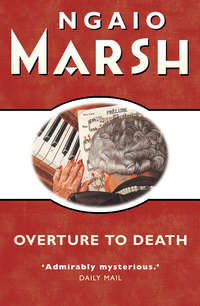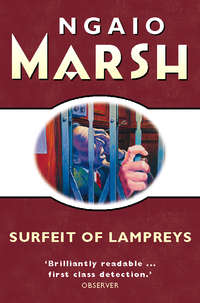
Полная версия
Singing in the Shrouds
Father Jourdain was saying: ‘Have you ever read that rather exciting thing of GKC’s: The Ball and the Cross?’
Jemima carefully made her eyes blank and faced front. Dr Makepiece returned uneasily to his book. He was filled with a kind of astonishment.
II
At about the same time as the bus passed by St Paul’s a very smart sports car had left a very smart mews flat in Mayfair. In it were Aubyn Dale, his dearest friend (who owned the car and sat at the wheel in a mink coat) and their two dearest friends who were entwined in the back seat. They had all enjoyed an expensive farewell dinner and were bound for the docks. ‘The form,’ the dearest friend said, ‘is unlimited wassail, darling, in your stateroom. Drunk, I shall be less disconsolate.’
‘But, darling!’ Mr Dale rejoined tenderly, ‘you shall be plastered! I promised! It’s all laid on.’
She thanked him fondly and presently turned into the Embankment where she drove across the bows of an oncoming taxi whose driver cursed her very heartily. His fare, a Mr Donald McAngus, peered anxiously out of the window. He also was a passenger for the Cape Farewell.
About two and a half hours later a taxi would leave The Green Thumb flower shop in Knightsbridge for the East End. In it would be a fair-haired girl and a box of flowers which was covered with Cellophane, garnished with a huge bow of yellow ribbon and addressed to Mrs Dillington-Blick. The taxi would head eastward. It, too, was destined for the Royal Albert Docks.
III
From the moment she came aboard the Cape Farewell, Mrs Dillington-Blick had automatically begun to practise what her friends, among themselves, called her technique. She had turned her attention first upon the steward. The Farewell carried only nine passengers and one steward attended them all. He was a pale, extremely plump young man with blond hair that looked crimped, liquid eyes, a mole at the corner of his mouth and a voice that was both strongly Cockney, strangely affected and indescribably familiar. Mrs Dillington-Blick took no end of trouble with him. She asked him his name (it was Dennis) and discovered that he also served in the bar. She gave him three pounds and hinted that this was merely an initial gesture. In less than no time she had discovered that he was twenty-five, played the mouth-organ and had taken a dislike to Mr and Mrs Cuddy. He showed a tendency to linger but somehow or another, and in the pleasantest manner, she contrived to get rid of him.
‘You are wonderful!’ her friend exclaimed.
‘My dear!’ Mrs Dillington-Blick returned, ‘he’ll put my make-up in the fridge when we get to the tropics.’
Her cabin was full of flowers. Dennis came back with vases for them and suggested that the orchids also should be kept in the refrigerator. The ladies exchanged glances. Mrs Dillington-Blick unpinned the cards on her flowers and read out the names with soft little cries of appreciation. The cabin, with its demure appointments and sombre decor seemed to be full of her – of her scent, her furs, her flowers and herself.
‘Steward!’ a querulous voice, at this juncture, had called in the passage. Dennis raised his eyebrows and went out.
‘He’s your slave,’ the friend said. ‘Honestly!’
‘I like to be comfortable,’ said Mrs Dillington-Blick.
It was Mr Merryman who had shouted for Dennis. When it comes to separating the easygoing from the exacting passenger, stewards are not easily deceived. But Dennis had been taken in by Mr Merryman. The spectacles, the rumpled hair and cherubic countenance had led him to diagnose absence-of-mind, benevolence and timidity. He was bitterly disappointed when Mr Merryman now gave unmistakable signs of being a Holy Terror. Nothing, it seemed, was right with the cabin. Mr Merryman had stipulated the port side and found himself on the starboard. His luggage had not been satisfactorily stowed and he wished his bed to be made up in the manner practised on land and not, he said, like an unstuck circular.
Dennis had listened to these complaints with an air of resignation; just not casting up his eyes.
‘Quite a chapter of accidents,’ he said when Mr Merryman paused. ‘Yerse. Well, we’ll see what we can do for you.’ He added: ‘Sir,’ but not in the manner required by Mr Merryman at his minor public school.
Mr Merryman said: ‘You will carry out my instructions immediately. I am going to take a short walk. When I return I shall expect to find it done.’ Dennis opened his mouth. Mr Merryman said: ‘That will do.’ Rather pointedly he then locked a case on his dressing-table and walked out of the cabin.
‘And I’ll take me oaf,’ Dennis muttered pettishly, ‘he’s TT into the bargain. What an old bee.’
Father Jourdain’s brother-priest had helped him to bestow his modest possessions about his room. This done they had looked at each other with the hesitant and slightly self-conscious manner of men who are about to take leave of each other.
‘Well – ’ they both said together and Father Jourdain added: ‘It was good of you to come all this way. I’ve been glad of your company.’
‘Have you?’ his colleague rejoined. ‘And I, needless to say, of yours.’ He hid his hands under his cloak and stood modestly before Father Jourdain. ‘The bus leaves at eleven,’ he said. ‘You’d like to settle down, I expect.’
Father Jourdain asked, smiling: ‘Is there something you want to say to me?’
‘Nothing of the smallest consequence. It’s just – well, I’ve suddenly realized how very much it’s meant to me having the great benefit of your example.’
‘My dear man!’
‘No, really! You strike me, Father, as being quite tremendously sufficient (under God and our Rule, of course) to yourself. All the brothers are a little in awe of you, did you know? I think we all feel that we know much less about you than we do about each other. Father Bernard said the other day that although ours is not a Silent Order you kept your own rule of spiritual silence.’
‘I don’t know that I am altogether delighted by Father Bernard’s aphorism.’
‘Aren’t you? He meant it awfully nicely. But I really do chatter much too much. I should take myself in hand and do something about it, I expect. Goodbye, Father. God bless you.’
‘And you, my dear fellow. But I’ll walk with you to the bus.’
‘No – please – ’
‘I should like to. ’
They had found their way down to the lower deck. Father Jourdain said a word to the sailor at the head of the gangway and both priests went ashore. The sailor watched them pace along the wharf towards the passageway at the far end of which the bus waited. In their black cloaks and hats they looked fantastic. The fog swirled about them as they walked. Half an hour had gone by before Father Jourdain returned alone. It was then a quarter past eleven.
Miss Abbott’s cabin was opposite Mrs Dillington-Blick’s. Dennis carried the suitcases to it. Their owner unpacked them with meticulous efficiency, laying folded garments away as if for some ceremonial robing. They were of a severe character. At the bottom of the second suitcase there was a stack of music in manuscript. In a pocket of the suitcase was the photograph. It was of a woman of about Miss Abbott’s own age, moderately handsome but with a heavy dissatisfied look. Miss Abbott stared at it and, fighting back a painful sense of desolation and resentment, sat on the bed and pressed clumsy hands between large knees. Time went by. The ship moved a little at her moorings. Miss Abbott heard Mrs Dillington-Blick’s rich laughter and was remotely and very slightly eased. There was the noise of fresh arrivals, of footsteps overhead and of dockside activities. From a more distant part of the passengers’ quarters came sounds of revelry and of a resonant male voice that was somehow familiar. Soon Miss Abbott was to know why. The cabin door had been hooked ajar so that when Mrs Dillington-Blick’s friend came into the passage she was very clearly audible. Mrs Dillington-Blick stood in her own open doorway and said through giggles: ‘Go on, then, I dare you,’ and the friend went creaking down the passage. She returned evidently in high excitement saying: ‘My dear, it is! He’s shaved it off! The steward told me. It’s Aubyn Dale! My dear, how perfectly gorgeous for you.’
There was another burst of giggling through which Mrs Dillington-Blick said something about not being able to wait for the tropics to wear her Jolyon swimsuit. Their further ejaculations were cut off by the shutting of their door.
‘Silly fools,’ Miss Abbott thought dully, having not the smallest interest in television personalities. Presently she began to wonder if she really would throw the photograph overboard when the ship was out at sea. Suppose she were to tear it up now and drop the pieces in the waste-paper basket? Or into the harbour? How lonely she would be then! The heavily-knuckled fingers drummed on the bony knees and their owner began to think about things going overboard into the harbour. The water would be cold and dirty: polluted by the excreta of ships: revolting!
‘Oh, God!’ Miss Abbott said, ‘how hellishly unhappy I am.’
Dennis knocked at her door.
‘Telegram, Miss Abbott,’ he fluted.
‘Telegram? For me? Yes?’
He unhooked the door and came in.
Miss Abbott took the telegram and shakily opened it. It fluttered between her fingers.
‘Darling Abbey so miserable do please write or if not too late telephone, F.’
Dennis had lingered. Miss Abbott said shakily: ‘Can I send an answer?’
‘Well – ye-ees. I mean to say – ’
‘Or telephone? Can I telephone?’
‘There’s a phone on board but I seen a queue lined up when I passed.’
‘How long before we sail?’
‘An hour, near enough, but the phone goes off earlier.’
Miss Abbott said distractedly: ‘It’s very important. Very urgent, indeed.’
‘ ’Tch, ’tch.’
‘Wait. Didn’t I see a call box on the dock? Near the place where the bus stopped?’
‘That’s correct,’ he said appreciatively. ‘Fancy you noticing!’
‘I’ve time to go off, haven’t I?’
‘Plenty of time, Miss Abbott. Oodles.’
‘I’ll do that. I’ll go at once.’
There’s coffee and sandwiches on in the dining-room.’
‘I don’t want them. I’ll go now.’
‘Cold outside. Proper freezer. Need a coat, Miss Abbott, won’t you?’
‘It doesn’t matter. Oh, very well. Thank you.’
She took her coat out of the wardrobe, snatched up her handbag, and hurried out.
‘Straight ahead, down the companionway and turn right,’ he called after her and added: ‘Don’t get lost in the fog, now.’
Her manner had been so disturbed that it aroused his curiosity. He went out on the deck and was in time to see her running along the wharf into the fog. ‘Runs like a man,’ Dennis thought. ‘Well, it takes all sorts.’
Mr and Mrs Cuddy sat on their respective beds and eyed each other with the semi-jocular family air that they reserved for intimate occasions. The blowers on the bulkhead were pouring hot air into the cabin, the porthole was sealed, the luggage was stowed and the Cuddys were cosy.
‘All right so far,’ Mrs Cuddy said guardedly.
‘Satisfied, dear?’
‘Can’t complain. Seems clean.’
‘Our own shower and toilet,’ he pointed out, jerking his head at a narrow door.
‘They’ve all got that,’ she said. ‘I wouldn’t fancy sharing.’
‘What did you make of the crowd, though? Funny lot, I thought.’
‘RC priests.’
‘Only the one. The other was seeing-off. Do you reckon, RC?’
‘Looked like it, didn’t it?’
Mr Cuddy smiled. He had a strange thin smile, very broad and knowing. ‘They look ridiculous to me,’ he said.
‘We’re moving in high society, it seems,’ Mrs Cuddy remarked. ‘Notice the furs?’
‘And the perfume! Phew!’
‘I’ll have to keep my eye on you, I can see that.’
‘Could you catch what was said?’
‘Quite a bit,’ Mrs Cuddy admitted. ‘She may talk very la-de-dah but her ideas aren’t so refined.’
‘Reely?’
‘She’s a man-eater.’
Mr Cuddy’s smile broadened. ‘Did you get the flowers?’ he asked. ‘Orchids. Thirty bob each, they are.’
‘Get on!’
‘They are! It’s a fact. Very nice, too,’ Mr Cuddy said with a curious twist in his voice.
‘Did you see what happened with the other lady reading over the elderly chap’s shoulder? In the bus?’
‘Did I what! Talk about a freezer! Phew!’
‘He was reading about those murders. You know. The flower murderer. They make out he leaves flowers all scattered over the breasts of his victims. And sings.’
‘Before or after?’
‘After, isn’t it awful?’ Mrs Cuddy asked with enormous relish.
Mr Cuddy made an indefinite noise.
His wife ruminated: ‘It gives me the creeps to think about. Wonder what makes him go on so crazy.’
‘Women.’
‘That’s right. Put it all on the ladies,’ she said good-naturedly. ‘Just like a man.’
‘Well, ask yourself. Was there much in the paper?’
‘I couldn’t see properly but I think so. It’s on all the placards. They haven’t got him, of course.’
‘Wish we’d got a paper. Can’t think how I forgot.’
‘There might be one in the lounge.’
‘What a hope!’
‘The old chap left his in the bus. I noticed.’
‘Did you? You know,’ Mr Cuddy said, ‘I’ve got quite a fancy for the evening paper. I might stroll back and see if it’s there. The bus doesn’t go till eleven. I can just do it.’
‘Don’t be long. You know what I’m like. If you missed the boat – ’
‘We don’t sail till midnight, dear, and it’s only ten to eleven now. I won’t be more than a few minutes. Think I’d let you go out to sea with all these fascinatin’ sailors?’
‘Get along with you!’
‘Won’t be half a tick. I’ve got the fancy for it.’
‘I know I’m silly,’ Mrs Cuddy said, ‘but whenever you go out – to the Lodge or anything – I always get that nervous.’
‘Silly girl. I’d say come too, but it’s not worth it. There’s coffee on down below.’
‘Coffee essence, more like.’
‘Might as well try it when I get back. Behave yourself now.’
He pulled a steel-grey felt hat down almost to his ears, put on a belted raincoat and, looking rather like the film director’s idea of a private detective, he went ashore.
Mrs Cuddy remained, anxious and upright on her bunk.
Aubyn Dale’s dearest friend looking through the porthole said with difficulty: ‘Darling: it’s boiling up for a pea-shuper-souper. I think perhaps we ought to weep ourselves away.’
‘Darling, are you going to drive?’
‘Naturally.’
‘You will be all right, won’t you?’
‘Sweetie,’ she protested, ‘I’m never safer than when I’m plastered. It just gives me that little something other drivers haven’t got.’
‘How terrifying.’
‘To show you how completely in control I am, I suggest that it might be better to leave before we’re utterly fogged down. Oh, dear! I fear I am going into a screaming weep. Where’s my hanky?’
She opened her bag. A coiled mechanical snake leapt out at her, having been secreted there by her lover who had a taste for such drolleries.
This prank, though it was received as routine procedure, a little delayed their parting. Finally, however, it was agreed that the time had come.
‘ ’Specially,’ said their dearest male friend, ‘as we’ve killed the last bottle. Sorry, old boy. Bad form. Poor show.’
‘Come on,’ said their dearest girl friend. ‘It’s been smashing, actually. Darling Auby! But we ought to go.’
They began elaborate leave-takings but Aubyn Dale said he’d walk back to the car with them.
They all went ashore, talking rather loudly, in well trained voices, about the fog which had grown much heavier.
It was now five past eleven. The bus had gone, the solitary taxi waited in its place. Their car was parked farther along the wharf. They stood round it, still talking, for some minutes. His friends all told Dale many times how much good the voyage would do him, how nice he looked without his celebrated beard, how run down he was and how desperately the programme would sag without him. Finally they drove off waving and trying to make hip-hip-hooray with their horn.
Aubyn Dale waved, shoved his hands down in the pockets of his camel-hair coat and walked back towards the ship. A little damp breeze lifted his hair, eddies of fog drifted past him. He thought how very photogenic the wharves looked. The funnels on some of the ships were lit from below and the effect, blurred and nebulous though it now had become, was exciting. Lights hung like globes in the murk. There were hollow indefinable sounds and a variety of smells. He pictured himself down here doing one of his special features and began to choose atmospheric phrases. He would have looked rather good, he thought, framed in the entrance to the passageway. His hand strayed to his naked chin and he shuddered. He must pull himself together. The whole idea of the voyage was to get away from his job: not to think of it, even. Or of anything else that was at all upsetting. Such as his dearest friend, sweetie though she undoubtedly was. Immediately, he began to think about her. He ought to have given her something before she left. Flowers? No, no. Not flowers. They had an unpleasant association. He felt himself grow cold and then hot. He clenched his hands and walked into the passageway.
About two minutes later the ninth and last passenger for the Cape Farewell arrived by taxi at the docks. He was Mr Donald McAngus, an elderly bachelor, who was suffering from a terrible onset of ship-fever. The fog along the Embankment had grown heavier. In the City it had been atrocious. Several times his taxi had come to a stop, twice it had gone off its course and finally, when he was really feeling physically sick with anxiety the driver had announced that this was as far as he cared to go. He indicated shapes, scarcely perceptible, of roofs and walls and the faint glow beyond them. That, he said, was where Mr McAngus’s ship lay. He had merely to make for the glow and he would be aboard. There ensued a terrible complication over the fare, and the tip: first Mr McAngus under-tipped and then, in a frenzy of apprehension, he over-tipped. The driver adopted a pitying attitude. He put Mr McAngus’s fibre suitcases into their owner’s grip and tucked his cardboard box and his brown paper parcel under his arms. Thus burdened Mr McAngus disappeared at a shambling trot into the fog and the taxi returned to the West End of London.
The time was now eleven-thirty. The taxi from the flower shop was waiting for his fare and PC Moir was about to engage him in conversation. The last hatch was covered, the Cape Farewell was cleared and Captain Bannerman, Master, awaited his pilot.
At one minute to twelve the siren hooted.
PC Moir was now at the police call-box. He had been put through to the CID.
‘There’s one other thing, sir,’ he was saying, ‘beside the flowers. There’s a bit of paper clutched in the right hand, sir. It appears to be a fragment of an embarkation notice, like they give passengers. For the Cape Farewell.’
He listened, turning his head to look across the tops of half-seen roofs at the wraith of a scarlet funnel, with a white band. It slid away and vanished smoothly into the fog.
‘I’m afraid I can’t board her, sir,’ he said. ‘She’s sailed.’
CHAPTER 3
Departure
At regular two-minute intervals throughout the night, Cape Farewell sounded her siren. The passengers who slept were still, at times, conscious of this noise; as of some monster blowing monstrous raspberries through their dreams. Those who waked listened with varying degrees of nervous exasperation. Aubyn Dale, for instance, tried to count the seconds between blasts, sometimes making them come to as many as one hundred and thirty and at others, by a deliberate tardiness, getting them down to one hundred and fifteen. He then tried counting his pulse but this excited him. His heart behaved with the greatest eccentricity. He began to think of all the things it was better not to think of, including the worst one of all: the awful debacle of the Midsummer Fair at Melton Medbury. This was just the sort of thing that his psychiatrist had sent him on the voyage to forget. He had already taken one of his sleeping-pills. At two o’clock he took another and it was effective.
Mr Cuddy also was restive. He had recovered Mr Merryman’s Evening Herald from the bus. It was in a somewhat dishevelled condition but when he got into bed he read it exhaustively, particularly the pieces about the Flower Murderer. Occasionally he read aloud for Mrs Cuddy’s entertainment but presently her energetic snores informed him that this exercise was profitless. He let the newspaper fall to the deck and began to listen to the siren. He wondered if his fellow-travellers would exhibit a snobbish attitude towards Mrs Cuddy and himself. He thought of Mrs Dillington-Blick’s orchids, heaving a little at their superb anchorage, and himself gradually slipped into an uneasy doze.
Mr Merryman, on the other hand, slept heavily. If he was visited by dreams of a familiar steward or an inquisitive spinster, they were of too deeply unconscious a nature to be recollected. Like many people of an irascible temperament, he seemed to find compensation for his troubles in the profundity of his slumber.
So, too, did Father Jourdain, who on finishing his prayers, getting into bed and putting himself through one or two pretty stiff devotional hoops, fell into a quiet oblivion that lasted until morning.
Mr Donald McAngus took a little time to recover from the circumstances that attended his late arrival. However he had taken coffee and sandwiches in the dining-room and had eyed his fellow-passengers with circumspection and extreme curiosity. His was the not necessarily malicious but all-absorbing inquisitiveness of the Lowland Scot. He gathered facts about other people as an indiscriminate philatelist gathers stamps: merely for the sake of adding to his collection. He had found himself at the same table as the Cuddys – the passengers had not yet been given their official places – and had already discovered that they lived in Dulwich and that Mr Cuddy was ‘in business’ though of what nature Mr McAngus had been unable to divine. He had told them about his trouble with the taxi. Distressed by Mrs Cuddy’s unwavering stare he had tied himself up in a tangle of parentheses and retired unsatisfied to his room and his bed.
There he lay tidily all night in his gay crimson pyjamas, occupied with thoughts so unco-ordinated and feckless that they modulated imperceptibly into dreams and were not at all disturbed by the reiterated booming of the siren.
Miss Abbott had returned from the call box on the wharf, scarcely aware of the fog and with a dull effulgence under her darkish skin. The sailor at the gangway noticed, and was afterwards to remember, her air of suppressed excitement. She went to bed and was still wide-awake when the ship sailed. She watched blurred lights slide past the porthole and felt the throb of the engines at dead slow. At about one o’clock in the morning she fell asleep.
Jemima Carmichael hadn’t paid much attention to her companions: it took all her determination and fortitude to hold back her tears. She kept telling herself angrily that crying was a voluntary physical process, entirely controllable and in her case absolutely without justification. Lots of other people had their engagements broken off at the last minute and were none the worse for it: most of them without her chance of cutting her losses and bolting to South Africa.
It had been a mistake to peer up at St Paul’s. That particular kind of beauty always got under her emotional guard; and there she went again with the man in the opposite seat looking into her face as if he’d like to be sorry for her. From then onwards the bus journey had seemed intolerable but the walk through the fog to the ship had been better. It was almost funny that her departure should be attended by such obvious gloom. She had noticed Mrs Dillington-Blick’s high-heeled patent leather shoes tittupping ahead and had heard scraps of the Cuddys’ conversation. She had also been conscious of the young man walking just behind her. When they had emerged from the passageway to the wharf he said:








